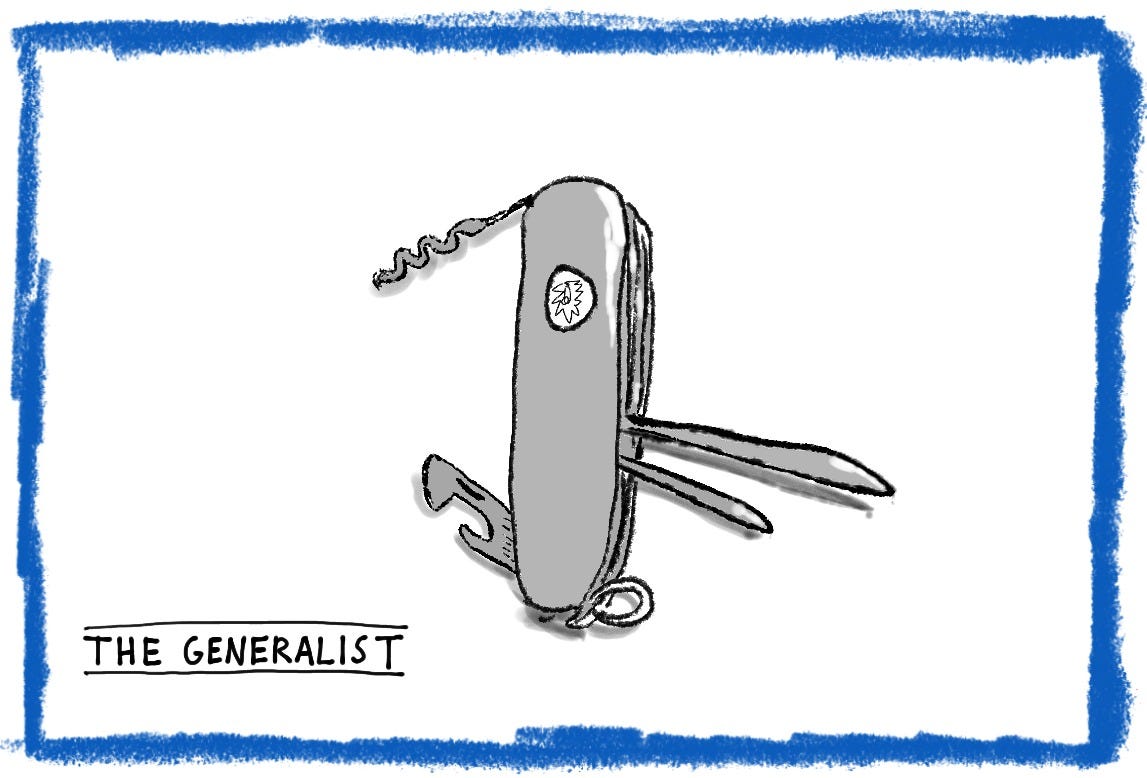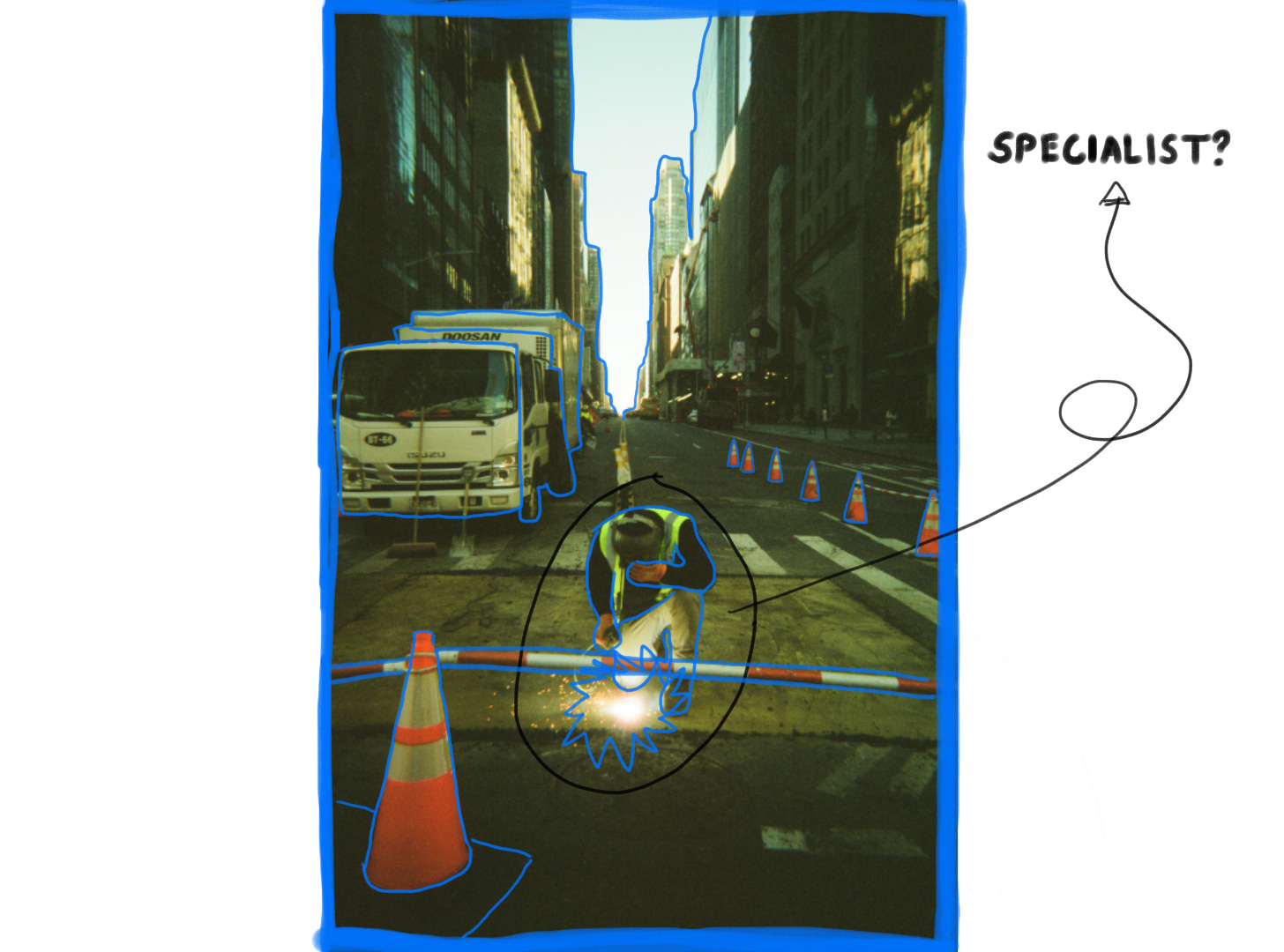Generalists vs Specialists [Part 1]
Which one is better — and does it even matter? Is there a third option?
I was twelve years old and it was my first middle-school homecoming; tacky ribbons were hanging from the ceiling, a projector was throwing nonsensical patterns onto the wall, and a dollar-store strobe light was doing its best to convince us seventh graders that we were ‘in da club’ rather than the gymnasium. A space had opened in the middle of the floor and everyone’s attention had become transfixed on whatever was taking place inside. I naively assumed that it was a fight. To my surprise, it was dancing.
After standing on the outskirts for some two or three songs, I jokingly pushed my friend inside the circle. He immediately jumped back to safety and returned the favor. Rather than back down from the challenge, I decided to give it a go. I wiggled my legs, hopped up and down, flailed my arms in circles about my head, and attempted some tortured variation of the worm. Visually speaking, it was a violent assault on every spectator — but it was enough to get me hooked. That same day I stole some sandpaper from my fifth period woodshop and used it to smooth down the ground of my home’s back patio. Using the glass of my sliding door as a makeshift mirror, I gave myself a crash course in all things hip-hop. Unsure of where to begin, I started where all self-taught dancers do — Michael Jackson videos and moonwalk tutorials.
Eventually, I Billie Jean-ed my way into the rich heritage of other styles: pop-lock, breaking, krump, turf, tutting, house, Chicago footwork, animation, waacking, shuffling, jooking, jerkin, and countless more. Hip hop became a fixture of my existence and I eventually found friends with similar passions. But while each of them chose to double down on a single discipline and learn one category especially well, my instinct was to explore and bend as many styles as I could. Where they chose to concentrate, I chose to combine.
Deep and Wide
In the professional world, this dichotomy is usually framed as being a specialist or a generalist. If useful, you can think about it as being deep versus being wide. In the dancing example, I chose the latter, while my friends chose the former.
Before the Industrial Revolution, workers never really had an option of specialization versus generalization. But coinciding with the advent of modern machinery and automation, the practice of dividing labor into segmented departments became more and more popular. As technology, management practices, and knowledge of every knowable field became more robust, companies were able to become bigger and bigger while also becoming more and more nuanced. Nowadays, there are countless job titles and endless niches of potential employment — so people want to know which approach gives them the best return on investment.
Tim Ferris’ Answer
Firstly, Tim Ferris gave one of my favorite answers to this question a few years ago. Being a self-employed author and angel investor, Ferris’ answer is heavily biased towards the individual’s development and prosperity, but it is valuable nonetheless:
If you want to just specialize and become a basketball player, you really need to be in the top .001% to do phenomenally well financially; otherwise, if you combine two skills that are valuable but even more rare (and therefore more valuable) together — like a computer science degree and a law degree or extreme knowledge of finance and or mathematics plus public speaking — automatically you have a competitive advantage that allows you to more likely end up in the top decile of earning power.
The primary takeaway being that a pair of uncommon proficiencies will make your personal value proposition more valuable and harder to imitate.
Molly Graham Chimes In
Then, a couple weeks ago, Molly Graham from The Lego Club wrote a phenomenal newsletter titled “There’s No Such Thing as a Generalist.” Graham argues that the labels are too narrow, and that they ultimately harm the employee and the organization by forcing a myopic perspective of both the role and the person who can fill it:
Instead of worrying about labels, the real unlock is this: we all need to define our specialty. Companies need to do the work to define the specialties they’re looking for in a given role, and individuals need to determine what they are exceptional at. You don’t need a perfect job title or to fit perfectly in a random function, but you do need to be able to clearly describe your specialty.
As an executive coach coming from the startup world, Graham’s advice naturally lends itself to bettering the fit between organizations and employees. Still, the gist of her exhortation is to find the overlap between your multiple competencies and distill it into an easily-proven, highly articulable description of your abilities.
Peter Drucker’s Response
Naturally, the father of modern management, Peter Drucker, had a balanced and useful approach to this question. In his famous book The Effective Executive Drucker stated the following:
The only meaningful definition of a ‘generalist’ is a specialist who can relate his own small area to the universe of knowledge… Maybe a few people have knowledge in more than a few small areas. But that does not make them generalists; it makes them specialists in several areas. And one can be just as bigoted in three areas as in one. The man, however, who takes responsibility for his contribution will relate his narrow area to a genuine whole.”
If you think this sounds like Miyamoto Musashi's famous quote —'If you know the way broadly, you will see it in all things'—then you're not alone. Deep understanding of a single subject often reveals patterns and surprisingly applicable insights about the world at large. This is because specialization is rarely as siloed as it appears. A PhD in architecture, for instance, cannot help but also learn a little bit about engineering, sustainability, and urban planning; not to mention soft skills like collaboration, time management, and communication.
Long Obedience, Same Direction
But, specialization can also yield more than just mere occupational competency. If you have ever met someone truly dedicated to a certain craft, you’ll be amazed at the perfume of wisdom that can accompany their presence wherever they go. Careful and patient attention spent in observation of a single subject has a noetic effect that is hard to diminish, even when that attention is later focused on a different subject. In Beyond Good and Evil, the admittedly problematic Nietzche describes this type of dedication as “long obedience” and asserted that it was an essential ingredient to the development of the West:
The essential thing "in heaven and in earth" is, apparently (to repeat it once more), that there should be long obedience in the same direction. Thereby results, and has always resulted in the long run, something which has made life worth living; for instance, virtue, art, music, dancing, reason, spirituality— anything whatever that is transfiguring, refined, foolish, or divine.
Learning how to discern the good insights produced by long obedience and separating them from symptoms of the Dunning-Krueger effect is, perhaps, what makes a mature professional. Yet years of labor in a certain field does not an expert make. In fact, it can just as easily open a mind as close it — or bigot it, to use Drucker’s language. The difference comes from whether or not an individual is humble enough to make the most of the incidental knowledge and integrate it into their arsenal in an exciting and relevant way.
Antidisciplinary
This leads me to another common framing for this binary, which is to pose the question as whether or not to be unidisciplinary, multidisciplinary, or interdisciplinary. However, the always-pioneering group at MIT’s Media Lab loves to use another related term: antidisciplinary.
Antidisciplinarian individuals utilize diverse approaches in order to create concepts and projects that are greater than the sum of the parts. It is an alloy of various specialties, but not a mere combination of them (that would be interdisciplinary). It steals from all the classrooms, but belongs in none of them. It exists in the hallways between subjects, so to speak. As Joi Ito, former head of the Media Lab wrote:
What it means to me is someone or something that doesn't fit within traditional academic discipline-a field of study with its own particular words, frameworks, and methods… For me, antidisciplinary research is akin to mathematician Stanislaw Ulam's famous observation that the study of non-linear physics is like the study of "non-elephant animals." Antidisciplinary is all about the non-elephant animals.
In other words, being antidisciplinary is a form of innovation, where creative concepts are produced by intellectual arbitrage — carrying ideas across boundaries, industries, and specialties in order to produce new and imaginative solutions. It takes the deep and the wide, then adds a tertiary dimension.
Professional and Personal
On an organizational level, antidisciplinary methodology opens new forms of participation and production. When given boundaries to run wild, it can better the lives of companies and, indeed, entire countries.
I am halfway through a macro-economics course for my MBA program, where multiple sessions were dedicated to teasing out the Cobb-Douglas production function — a mathematical formula used by economists to measure economic output. In the function, almost all long-term growth is driven by a single variable: total factor productivity. TFP is a somewhat mystical number and can more or less be equated to innovation and technological advancement. It is an economist's best attempt at putting a number on the magic ingredient that creates a prosperous country: human ingenuity.
Of course, human ingenuity—and by extension, antidisciplinary thinking—requires facilitation. Certain principles that I’ve written about before help create a bottle to fit the lightning inside of: a posture of play, psychological safety, seeing beyond the org chart, risking imperfection, etc… but the effort is well worth the return.
On a personal level, an antidisciplinary approach to professional development is not only worthwhile, but also a lot more fun. It gives permission for people to be curious, explore their interests, and break free from the angst of whether or not they are maximizing their efforts in the right direction. It helps take the edge off wondering whether or not a certain number of specialities is adequate by reminding people that those specialities can be combined, mixed, and meshed in unexpected ways.
In other words, antidisciplinarians recognize that nothing is ever wasted. Whether you decide to go deep or wide — and especially if you regret doing either — there is always another direction for you to dig.
Conclusion
I gave a lot of quotes today, but here is my last. From David Epstein’s book Range: Why Generalists Triumph In A Specialized World, we come full circle to the opening example:
Everyone needs habits of mind that allow them to dance across the disciplines.
So, what do you think? Generalist or Specialist? Both? Neither? This newsletter is far from solving the debate and I would love to know what resonated, missed, and should have been included. If this subject appeals to you, I wholeheartedly recommend that you check out some of the resources that I’ve linked. Until next week.
Curiously yours,
Bradley









I've heard "long obedience in the same direction" used for spiritual guidance (by our friend Peterson mainly) but never applied in the context of vocation and disciplines. I love it. This is witty and thoughtful in many ways!
Loved this! Really well thought out, researched, and crafted. A few points:
1. As I’ve personally trended towards a strengths-based approach towards professional growth, I’ve become more and more comfortable with my status as “definitely not a specialist but someone who spikes in a couple of competency areas.” The framing you reference here of maximizing such a unique combo to one’s own advantage is really edifying to me.
2. Beyond Good and Evil is such a momentous work for obvious reasons but I actually think Nietzsche’s long obedience can be recast in light of the framework in point 1. Each individual has a unique combination of skills, and for some individuals that combo is a mixture of single-mindedness and divine inspiration that produces singular artistic/inventive/etc talents.
3. Props for writing a whole piece on generalists and not using the phrase jack of all trades even once.
4. Rather than your own generalist approach to dancing, my best moves are entirely within the sphere of jerking. Blame my Southern California upbringing for that!